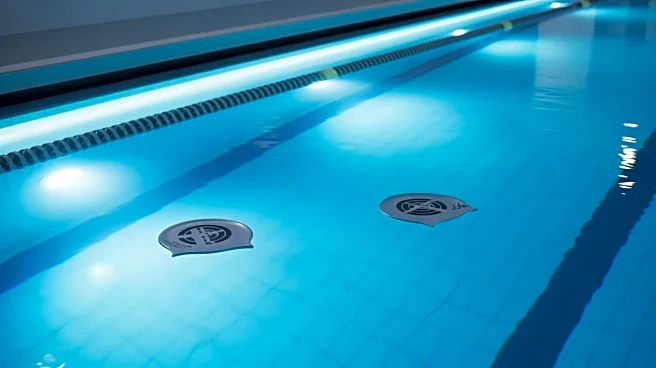What's Happening?
Australian swimmers Mollie O'Callaghan and Kaylee McKeown have set new world records during the second leg of the World Cup held in Westmont, Illinois. O'Callaghan, the reigning 200m Olympic champion,
achieved a time of 1:49.77 in the 200m freestyle, surpassing the previous record set by Siobhán Haughey. McKeown broke the world record in the 200m backstroke with a time of 1:57.87, defeating her long-time rival Regan Smith. Both athletes received bonus cheques of US$10,000 for their record-breaking performances. The event marks a significant moment in Australian swimming, following the recent retirement announcement of Ariarne Titmus, a four-time Olympic champion.
Why It's Important?
The achievements of O'Callaghan and McKeown highlight the strength and depth of Australian swimming talent on the international stage. Their record-breaking performances not only bring prestige to Australian swimming but also set a high standard for future competitions. The retirement of Ariarne Titmus, who was a prominent figure in the sport, opens opportunities for new leaders to emerge, and these records suggest that O'Callaghan and McKeown are poised to take on that mantle. Their success may inspire younger athletes and contribute to the continued development of swimming in Australia.
What's Next?
With the retirement of Ariarne Titmus, the focus will likely shift to O'Callaghan and McKeown as they continue to compete and potentially break more records. Their performances may influence the selection and training strategies of the Australian swimming team as they prepare for future international competitions, including the Olympics. Stakeholders in the sport, such as coaches and sponsors, may increase their support for these athletes, recognizing their potential to lead Australian swimming into a new era.
Beyond the Headlines
The retirement of Ariarne Titmus at the age of 25 raises questions about the pressures and challenges faced by elite athletes. Her decision to prioritize personal life over competitive swimming may spark discussions about athlete welfare and the balance between professional sports and personal fulfillment. This could lead to broader conversations within the sports community about supporting athletes in making life transitions and ensuring their well-being beyond their competitive careers.











